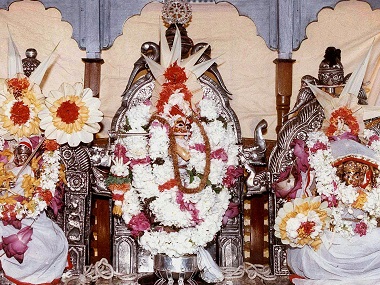Duryodhana is a common name among Oriyas. So is Dushasana.
I did not know that until this week, when I visited Bhubaneswar and Puri to see the great Jagannath Temple.
I usually go to these places because I find their history and architecture fascinating. And to discover that India is not culturally uniform, though it may appear that way to outsiders.
The idea that a parent would name their son Dushasana, considered a villain of the Mahabharata as we have been taught, would be astonishing to people living in Gujarat or anywhere else in India. The Oriyas are clearly an interesting people, with a cultural depth that many of us who only encounter them working very hard in blue collar jobs, have not plumbed.
On this trip, I took along my mother-in-law’s family, who are Bengali Brahmins and more interested in worship than I am. I have no particular problem with God, but I already have been given so much that it is embarrassing to ask for more. So I don’t.
A board outside Jagannath Temple states in several languages that only Hindus are allowed inside. I must confess, I simply don’t understand the logic. Churches — including the Vatican, the most famous of them all and which displays its artefacts with pride — do not have this rule. However, the Saudis do not allow non-Muslims into Mecca, though we are told that Guru Nanak made the pilgrimage.
Some years ago, when I was in Lahore, I visited the gurudwara of Guru Arjan with some local friends. A board, probably put up by the government, stated that Muslims were not allowed to enter. We ignored the warning. When the Sikh caretakers made enquiries about us, my companions, who brought their son Arjun with them, did not lie. The caretakers insisted we leave the boy with them while the rest of us toured the gurudwara.
In India, mosques, churches and gurudwaras are open to all. I’d encourage Hindus to visit their local mosque. They will be welcomed and will find it rewarding, whether or not they are interested in Islam.
Why exclude those who are curious about our faith but not born into it? Why take away their opportunity to experience the Jagannath Temple? It can’t be because this is what the Hindu scripture insists. If that were true, all temples would have this rule. They don’t. However, one notices that increasingly, major temples exclude foreigners and non-Hindus. This year, I saw such a board outside the sanctum sanctorum at the Meenakshi Temple in Madurai and also at Pashupatinath Temple in Nepal.
The great singer Yesudas, who was born a Christian, has consistently been denied entry into temples like Guruvayoor where he wants to sing bhajans. He will be allowed into Padmanabhswamy Temple on 30 September. But only after submitting an affidavit stating he believed in Hindu customs.
One explanation for this exclusion could be thus: Because Hindus do not convert others, they feel entitled to leave out those communities which do. But this is difficult to prove. The fact remains that temples have always excluded people, especially other Hindus. Gandhi went on a fast in the 1930s because the Swaminarayan sect’s temples (run by my community of Patidars) did not want the lower castes to enter.
In fact the Swaminarayan sect tried to present themselves in court as a minority, non-Hindu community rather than agree that lower castes could enter. So, could this prejudice about caste purity be the reason why “others” are being excluded from our temples? I sincerely hope not.
Jagannath’s Pandas famously prohibited Indira Gandhi from entering, even though she was born Hindu and cremated as per the Hindu custom. In 2012, it was reported that the Pandas put up a board outside the temple which stated ‘only orthodox Hindus allowed’. I did not see this particular sign but their behaviour is puzzling.
Orthodox Hinduism is purely about the Varna system, which the Constitution specifically prohibits through articles 14-17. Only if one follows the Varna system (meaning untouchability and accepts that Shudras should not be taught the Vedas) is one orthodox. So who are the Pandas trying to allow inside?
That sign was put up after an American man married to an Oriya woman tried to participate in the Rath Yatra and was beaten up by the Pandas. The wife, named Silpi Boral, reportedly said: “This is injustice. When Lord Jagannath is considered lord of the universe, how can anyone deny permission to my husband?” I see her point. I wish the Puri temple and other temples would clearly explain why they are excluding people from participation.
The Jagannath Temple is beautiful. Both its architecture and the highly unusual idols, are not anthropomorphic (meaning shaped like human beings). They are unique. We went at the time of the final aarti. Only a few people were around. Having seen the murti, I turned around to face the crowd. This is always rewarding as Hindus, while doing worship, are more demonstrative than others. We hold our hands up, prostrate ourselves and roll around.
Why is this? Perhaps because unlike in a church, mosque or gurudwara, our prayers are not communal but individual. We need to ensure that we are ‘seen’ by the idol and must therefore make some gesture to stand out from the crowd. Is that the reason for excluding others? That we’re seeking the deity’s undivided attention?
I was greatly moved as I examined the worshippers’ faces: Many of them poor, but exhibiting real devotion and belief. I wish more people could be allowed that experience. Both the passion and ecstasy of Hindu devotion, and the pleasure of bearing witness to it.


)




)
)
)
)
)
)
)
)